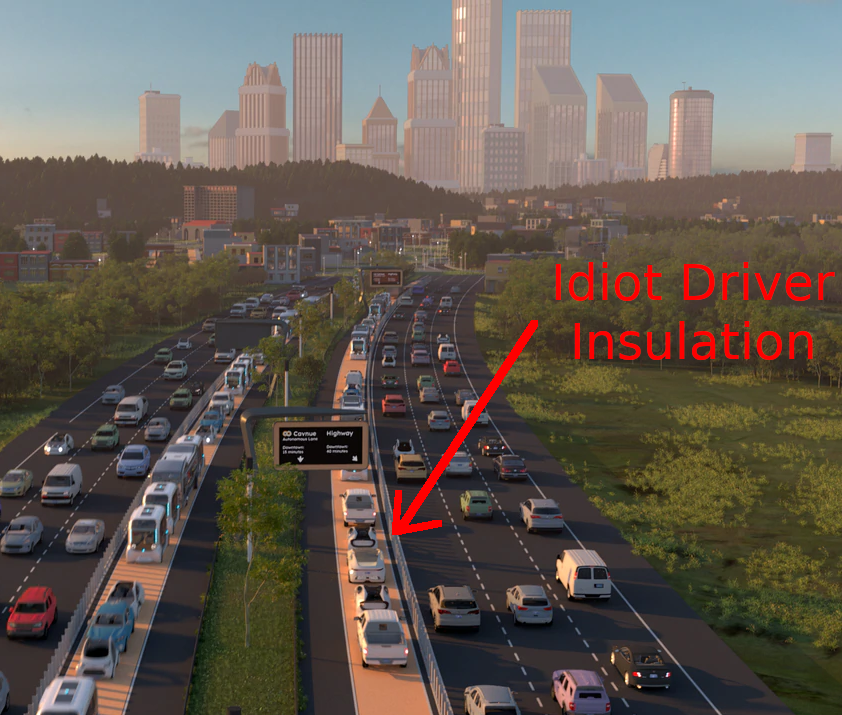Real Progress In Autonomous Vehicles
:date: 2020-08-14 12:44 :tags:
Regular readers may notice a decline in posts about autonomous vehicles. Rest assured, I'm bringing to light everything interesting in the field. The problem has been a conspicuous lack of anything interesting. There are only so many times I can say "They're doing it wrong and will fail." But today some PR hype crossed my path that is actually on the correct trajectory so I wanted to highlight it.
Apparently the company behind this is the same one that recently canceled a giant project reimagining Toronto. They have some access to Alphabet and beaucoup Googlebucks which could be good or bad.
What's somewhat unnerving to me is that I wonder if any of the people involved in this project understand why it is the correct approach. That sounds like a strange and pretentious thing to say, but note how all the press releases stress the connected aspect of this project; apparently CAVenue, their marketing name, stands for "connected autonomous vehicle". Here is their own press release saying that.
They seem utterly fixated on the wrong thing. They claim they are trying to "develop the world’s most sophisticated roadway" but that can not be true. What they hope to build will ideally be less sophisticated than any random road. No, I don't care about the V2V distractions and great network coverage so people can adore their phones better. I'm talking about the brains here. Do you think their roads will match the sophistication of the sum total of human minds currently required to function on normal roadways? No. They will most certainly not do that.
But that's just it. What we need isn't a more sophisticated road. We need a less sophisticated road. Look at any of the PR shots of this thing. What is really going on that is profound and useful is what I call "idiot driver insulation".

That is the necessary and sufficient requirement to end human driving completely. We are not waiting on technology. We are waiting to do the simple things necessary to make the real problem not a problem.
I suspect that this move is shrouded in "connectedness" to distract the Silicon Valley people while real progress is made. The connectedness of vehicles is utterly irrelevant. Weather sensors, a perfectly good idea, are not essential. Platooning (as shown in the image) may one day be helpful for many reasons but so might teleportation. No, the real breakthrough here is simply clearing the road of idiot drivers.
If you're following my logic here, then one question should come up: why not just build a light rail (like the kind my neighbors rightly complain about for the wrong reasons)? It is a good question and I think that the value proposition works today because the physics benefits of commuter rail are not as heavily leveraged as freight rail where steel on steel is important to energy budgeting.
I believe that autonomous cars running on a closed single corrider would still have some advantages. First is better on demand scheduling; with rail the granularity is an entire passenger car. Starting and stopping disadvantages rail but is easier for smaller shuttles and even very small transportation pods. It is also easier to integrate small freight shipments into the closed corridor. For example, how would Amazon send a couple of delivery vans down a light rail corridor? They can't.
But the huge advantage and why I very much hope this project doesn't hype-fizzle away is that this arrangement provides the launch pad for mixed mode cars. The reason you can't sleep (alone) in your moving Tesla (or Cadillac for that matter) is because it is not on one of these roads. There are no other impediments. When people can choose a road where they can stop driving completely, I believe they will.
Sure, 99.999% of all other roads require the dangerous and tedious chore of driving, but if there's one shining example of how it could be, maybe people will start to think differently about how every road might be organized. I certainly hope this will spark some discussion and thinking about the correct way forward.
If you really want to understand this news you can go back and revisit my 2016 post where I predict this exact development. Indeed, although we have finally managed to claw our way back to exactly where we were in 1997 (or even 1969), in the world of autonomous vehicles, that is immense progress. Let us hope we don't retrogress again.